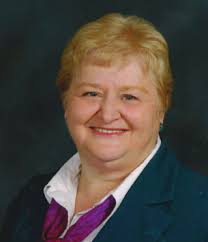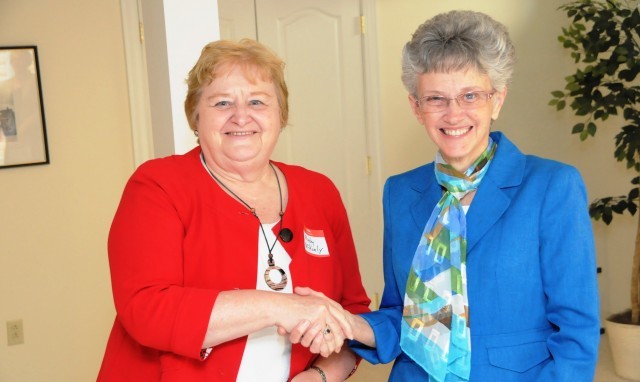Although she retired from active pastoral ministry in 2015, the Rev. Melinda “Mindy” McKonly still chairs the Eastern PA Conference Board of Ordained Ministry and will step down from that position at Annual Conference in June. We asked her to reflect on her experiences and observations about the board and the state of ordained ministry in this conference, as well as her outlook for the future.
But 2016 is the 60th anniversary of the 1956 General Conference’s decision to finally mandate clergywomen’s right to full ordination and conference membership in the then-Methodist Church. (The former Evangelical United Brethren Church had already enfranchised clergywomen with that right years earlier.) Thus, we also asked Rev. McKonly, who became a full clergy member of the conference in 1979, to reminisce about her call and entry into ordained ministry and the struggle of women pastors to gain acceptance then and now.
 Most of this article is in Mindy’s own words, offered in February in response to questions we asked. But we begin first with a bit of her life-story as shared in a June 20, 2015, article about her, written by Lancaster Newspapers Correspondent Joan Kern and titled “Rev. Mindy McKonly’s well-earned retirement.” The article begins:
Most of this article is in Mindy’s own words, offered in February in response to questions we asked. But we begin first with a bit of her life-story as shared in a June 20, 2015, article about her, written by Lancaster Newspapers Correspondent Joan Kern and titled “Rev. Mindy McKonly’s well-earned retirement.” The article begins:
The Rev. Mindy McKonly was barely a teenager when she had an experience in a worship service that she still finds difficult to talk about.
“I heard a voice say, ‘You’re going to be a minister.’ I never told anyone. I didn’t know what it meant. I had never seen a woman pastor. I thought it meant I would be a missionary in Africa.”
For years, McKonly, who grew up in West Hempfield Township, assumed her involvement in church choirs, youth ministry and teaching school was the fulfillment of her call to ministry. She graduated from Hempfield High School and Millersville State College and then taught sixth grade at Mountville Elementary School, where she had once been a student.
But when it became clear that God had a larger vision for her life, she left teaching and enrolled in Lancaster Theological Seminary. After graduating, she became a probationary member of the conference in 1977, a full member in 1979 and went on to serve churches in Chester, Lehigh, Montgomery and Berks counties, plus eight years as superintendent of what is now the Eastern PA’s Conference’s Northeast District.
McKonly’s views about clergywomen
I was among the first wave of clergywomen ordained in the conference, but not the first. The EUBs were ordaining women before the Methodists approved doing it in 1956. But when I felt God calling me to ministry in the early ‘60’s, I had yet to meet another woman who was ordained in the church.
I was enrolled in the Master of Divinity program in seminary before I finally accepted that my call could be to ordination. And then I checked the Book of Discipline to make sure I could get out of it if I went in that direction.
I was ordained by Bishop James Ault. When our class was presented to the Clergy Session, he noted the number of women in the class and told the body that if he heard that any clergy members were speaking out against women clergy charges would be brought against them. It was the first time I really felt that I was welcomed and belonged in the ministry.
In the ‘70’s and ‘80’s women clergy really felt the need to band together for support. We talked to each other about raising children and serving a church and about the problems that were unique to women in our appointments. We monitored the appointment process as far as women’s appointments were concerned. We were bold enough to meet with the Bishop and Cabinet and even brought in outside consultants to help train us all in issues related to women in ministry.
Some of our brothers in ministry were nervous about our presence in the conference. At district clergy gatherings the women often talked together, and men would say things like, “What are you up to now?”
As the numbers of women clergy grew we became more diverse, and fewer of us felt the need for other women’s support. There were more women in the hierarchy and receiving appointments to larger churches. Today the clergywomen’s group, now called Women in Professional Ministry, still gathers from time to time for a time apart and for encouragement.
We are currently in an era where great change is happening in the church. Congregations are not as secure financially as they were in the past. But in this environment I have heard of more congregations stating that they do not want a woman or person of color appointed to their churches. In the past, this statement would have been challenged; but often I’m afraid it is not.
There is still a bias in congregations who believe that a male pastor brings more prestige and leadership than women. The church really reflects our society, and I’m finding this attitude in our culture as well.
McKonly’s views about ordained ministry
The theological, ethical and ecclesiastical issues around human sexuality have been a part of the church for as long as I have been a pastor. Again, we are a reflection of our society. As our country has become more polarized, so has the church.
I became Chair of the Board as the church trial of the Rev. Frank Schaefer was taking place. Once the trial was over, there was no ongoing court, judge or jury. So the jury moved the final decision (on Schaefer’s ministerial orders) to the Board. The advice of counsel to the (presiding) Bishop was that unless Frank could say unequivocally that he would never officiate at a same-sex marriage again, we would have to ask for his credentials as a pastor. And that is what happened. On appeal, that was overturned. They determined that we can’t remove orders because of what someone might or might not do in the future.
It isn’t a secret that I believe that our Book of Discipline needs to be changed. But when it comes to my responsibility as a member of the Board of Ordained Ministry, I uphold the Discipline.
There are some in the conference who think that is not enough, that the Board Chair and the Bishop should be personally bringing charges against people who read the Discipline differently (Social Principles, paragraph 161f) and who commit a chargeable offence under paragraph 2702. I don’t think I have ever been called to law enforcement.
I wish we could reason together on this issue and wait for a time of consensus, but the polarization in the conference and the general church has been getting more volatile and intense. It’s “win/lose” rather than open discussion.
But to be truthful, this issue has not taken up more than a small amount of time on the Board. Our membership comprises people on both extremes of that issue; but most are in the middle somewhere. We work together well, with a heavy responsibility for providing the church with leaders for the future.
I think there is going to be a major shift in the way we do ministry in the 21st century. We need leaders who have a strong commitment to Christ and the ability to envision ministry in a new way.
After the last interview retreat for ordained ministry candidates, I have to say I feel hopeful for The United Methodist Church. This class is considerably younger than the last, which means that God is still calling young people into the ministry. I am uplifted by their joy and enthusiasm for ministry.
One of the changes in the 2012 Discipline was a requirement that our candidates for ordination do a project to demonstrate their fruitfulness in ministry. The goal is not for candidates to have an unqualified success, but to learn from their efforts.
One candidate described an effort in his church and community to stop complaining about the families who skip church to participate in organized sports, but instead to take church out to the sports fields. Another talked about her efforts to help her congregation reach out to the community to help people provide nutritious meals with food pantry fare. Others are helping their congregations to move beyond their walls and take the mission of Christ to the community.
Another change in ministry in our conference is the number of people who are being called to the ministry of an ordained Deacon, who are called to serve in the world and to connect the church to service in the community. This year we have approved six candidates for ordination: three Elders and three Deacons.
We have more ordained Deacons in our conference than any other conference in the Northeastern Jurisdiction. I believe this change is another positive step toward equipping us to be in ministry in this century.
Although I am a retired UM pastor, it has been my joy to continue to serve on the Board this year. As we begin a new quadrennium in July, there will be new leaders and members of the Board of Ordained Ministry who will help lead us into the future.
Thank you, Mindy, for your candor and for your commitment to serving Christ and the church through ordained ministry.

